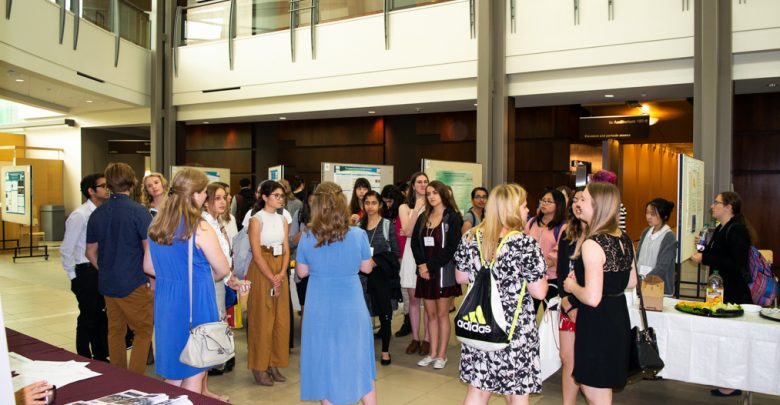 Jonathan Hocnalon
Jonathan HocnalonThirty-seven Grade 11 students from across Alberta convened for the Women in Scholarship, Engineering, Science and Technology (WISEST)’s “Celebration of Research” event to showcase the results of their summer research program.
The students, 34 of whom were female, participated in a six-week long research program at the University of Alberta, culminating in their work being displayed in the Telus Centre on August 15. The research was carried out under the supervision of university professors, and topics ranged from chemistry, engineering, computing science, and medicine — fields that normally lack gender representation.
“We look at diversity as a valuable aspect in all areas of life,” said Fervone Goings, the WISEST team lead. “There’s a term called collective intelligence: when a group is diverse, the intelligence of the group actually increases.”
Some of the students joined the program on the recommendation of a teacher, to explore other fields, to inspire others entering non-traditional workplaces, or to reaffirm their career choice. The projects included a 3D print of an Albertosaurus fossil and the detection of birds based on their sounds by Keeley Hatch of Archbishop Jordan Catholic High School and Dylan Vadnais of Vegreville Composite High respectively.
Comparing high school to university, many of the students said they enjoyed the U of A’s welcoming environment and advice from their colleagues. They were also able to use tools and techniques that would normally be inaccessible to high school students, such as immunotherapy or certain programming software.
“In high school, you’re doing labs where the results are already expected, where you’re doing what the teacher tells you,” said Wendi Yu from Old Scona Academic High School. “But in a scientific lab, you encounter problems that you weren’t expecting and you have to find your own solutions to them.”
Aside from technical skills, some students stressed the growth they experienced, especially since their work was mostly self-directed. This led them to mature in terms of confidence and assertiveness.
“At the beginning of the project, I thought maybe I shouldn’t suggest [certain ideas] because it’s kind of pushing it,” said Hannah Bayne from Ardrossan Junior Senior High. “By the end, I learned it’s important to ask questions and point out things that you think you can do better, and that getting better means taking criticism and giving criticism, all in a constructive way.”
Although they appreciate how working in a different field helped them become a more well-rounded researcher, some students remain firm in their original career choice. For Alysha Ambrosio from Archbishop O’Leary High School, who did her project on immunology, this means finding ways to transfer and apply her knowledge to engineering.
“With WISEST, I’ve seen so many more careers, I’ve been exposed to so many more things, that I would be like, ‘Oh, that would be perfect too,’” Ambrosio said. “It’s definitely opened a lot more doors, and there are so many careers I never really knew about, but I have narrowed it down.”
WISEST holds two other larger programs over the year: the Science, Engineering and Technology (SET) conference for high school girls, and the Choices conference for Grade 6 girls. Goings hopes that people will continue to enter underrepresented workplaces, especially women in trending careers like digital science communication.
“Don’t let the fear in being in a non-traditional role prevent you from going for it,” Goings said. “There’s a place for you and opportunities.”




